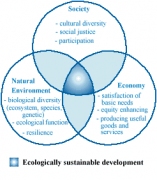
Logan and Albert Conservation Association

 Griffith University Logan campus auditorium 13 September 2010 hosted the first Brisbane Institute forum to be held in Logan. Continuing the series of population growth forums, audience and speakers looked at the opportunities and challenges for Logan, one of two regions proposed to absorb some of the people moving to Queensland's south east corner. According to the moderator, The Courier-Mail's Anna Reynolds,who hosted an absorbing discussion on the issues, opportunities and challenges of managing Queensland's population growth - especially in Logan's Flagstone and Yarrabilba communities, this forom was the best attended - with over 200 residents - current residents who are concerned that any growth in Logan is managed in a more ecologically stainable manner.
Griffith University Logan campus auditorium 13 September 2010 hosted the first Brisbane Institute forum to be held in Logan. Continuing the series of population growth forums, audience and speakers looked at the opportunities and challenges for Logan, one of two regions proposed to absorb some of the people moving to Queensland's south east corner. According to the moderator, The Courier-Mail's Anna Reynolds,who hosted an absorbing discussion on the issues, opportunities and challenges of managing Queensland's population growth - especially in Logan's Flagstone and Yarrabilba communities, this forom was the best attended - with over 200 residents - current residents who are concerned that any growth in Logan is managed in a more ecologically stainable manner.
Can Logan take the load?
Logan Mayor Pam Parker, Urban Land Development Authority CEO Paul Eagles, RPS Chairman Jim McKnoulty, local business leader Kerry Armstrong and Griffith University planning professor Brendan Gleeson shared their perspectives, followed by a lively debate covering employment opportunities, infrastructure, household affordability and community cohesion.
The answer? Yes, Logan can take the load... but not without significant government investment and much, much more community consultation and involvement!
Some attendees may not agree with this published outcome! What is the cost of loosing 32% of Logan's green space? as Mayor Pam Parker espoused we would still have 50% green - compared with our current 18% urban. These are percentages that require further investigations?
The discussion of food security for the future is one which we should all consider.
Michael Lardelli is Senior Lecturer in Genetics at The University of Adelaide. Since 2004 he has been an activist for spreading awareness on the impact of energy decline resulting from oil depletion. He has written numerous articles on the topic published in The Adelaide Review and elsewhere, has delivered ABC Radio National Perspectives, spoken at events organised by the South Australian Department of Trade and Economic Development and edits the (subscription only) Beyond Oil SA email newsletter. He has lectured on "peak oil" to students in the Australian School of Petroleum.
His article was first published May 6 2010 by Energy Bulletin, Archived May 6 2010 and has been published in On Line Opinion here.
The concluding paragraphs of the well researched article state
By 2050, if Australia is to survive as a nation, our agriculture will need to have adapted to climate change, instituted radical measures to recapture and recycle nutrients (e.g. using human and animal wastes as fertiliser) and have, somehow, compensated for the loss of cheap and plentiful fuel. We have not even begun to move in the direction of the more local, intensive but lower energy agriculture that will be necessary and we have less than four decades to accomplish it! In the face of these challenges it is highly unlikely that we will be able to support 36 million people. Indeed, even supporting our current population might prove a significant challenge.
VAST satellite cities could be built between Brisbane and the Gold Coast to ease the crippling population pressures threatening southeast Queensland, according to Logan Mayor Pam Parker. Speaking on the Gold Coast at The Courier-Mail's Our Future Your Say forum, Cr Parker said the areas around Logan and Ipswich, which still held large tracts of greenfill land otherwise rare in the southeast corner, would be perfect for taking the strain off the major cities to the north and south which are already battling housing affordability and land availability problems.
"These areas (Logan and Ipswich) have vast greenfill space which could house satellite cities where people could live, work and play," she said.
"This would help to ease the gridlocked traffic on our freeways and pressures on our existing infrastructure." You can hear Mayor Parker's speech online at http://www.couriermail.com.au/news/queensland/push-for-satellite-cities-to-ease-population-pressure/story-e6freoof-1225836732561
She said Logan and Ipswich – often been viewed as poor cousins of the Gold Coast and Brisbane – would appeal to new arrivals wanting the best of both worlds without having to shell out the higher costs for housing in both centres.
She also said Logan would be able to offer a lower density of housing which would be attractive to new residents wanting room to grow their families, instead of living in confined apartments in the cities.
The second forum in The Courier-Mail's Our Future Your Say series, in partnership with Griffith University and the Brisbane Institute, drew about 60 people to Griffith University's Parkwood campus last night.
The Bligh Government has called a special summit on population growth for later this month and appointed a panel of experts to advise it how to ensure the state's lifestyle does not fall victim to urban sprawl.
Premier Anna Bligh has flagged a range of incentives for people who commit to living in regional Queensland and committed to drawing up a state migration plan.
Can Queensland continue to welcome the thousands of people each week who want to move here?
Will our infrastructure cope or are those calling for a population cap threatening the state's jobs growth?
Will we all have to get used to living closer to each other in higher density suburbs?
The State Government is gearing up for a population growth summit on March 30 and 31.
Panel members:
Professor Paul Burton: Deputy Director, and Chair of Urban Management - Gold Coast, Griffith University Urban Research Program.
Najda Kunz: Nadja holds a dual degree in chemical engineering and business management. She is a member of both the Queensland Youth Environment Council (QYEC) and Engineers without Borders.
Councillor Pam Parker: Mayor of Logan City. As Logan City's first female Mayor, she is drawing on her long-term Council experience and rapport with the community to cater for the city's 261,000 residents and plan for the city's future.
Brian Stewart: Brian is the CEO (Qld.) Urban Dervelopment Institute of Australia.
Register your attendance by emailing your name and contact details to: This email address is being protected from spambots. You need JavaScript enabled to view it..
Click here for campus map including parking locations
Andrew McNamara who served three terms in the Queensland Parliament as Member for Hervey Bay between 2001 and 2009 and was Minister for Sustainability, Climate Change and Innovation in the previous term of the Bligh Government wrote
The failure to recognize and confront the danger of exponential population growth now transcends every other problem that confronts us. The idea that the world's population will be "stable" at 9 or 10 billion is ludicrous, as we watch refugee flows ramping up as a result of water and food shortages now. The answers to the issues of climate change, food security, energy security and water security cannot be found without acknowledging one simple fact.
If you are attending the forum please consider your mode of transportation and lessen impacts of your journey. Hope to see you there!
.
Growth head and shoulders above India newspapers Australia wide 22 and 23 September reported on the escalating population of Australia. Economists continue to view this with enthusiasm - unlike those of us - who like MP Kelvin Thomson do not subscribe to the view that more is better and essential for economic growth. Humans are consuming resources at an unsustainable rate and overconsumption will increase our production of greenhouse gases.
More Australians will mean more greenhouse gases - whether our population increase is natural with our increasing fertility rates or through immigration. The Sydney Morning Herald and newspapers Australia wide are reporting that AUSTRALIA is poised to be the world's fastest growing industrialised nation over the next four decades, with a rate of population growth higher even than India. An economist at the Grattan Institute, Saul Eslake, said strong population growth was one of the main reasons Australia had recently avoided a recession. Economic output per head declined for four consecutive quarters, but because there were more people, the economy still recorded growth.
KELVIN THOMSON JOINS POPULATION ROLL OF HONOUR
Kelvin Thomson's brilliant speech on population in Federal Parliament Monday 17 August 2009 allows him to be placed on an Australian honour roll of politicians who understand the detrimental impacts of population growth, according to Sustainable Population Australia Inc (SPA).
SPA's national president, Sandra Kanck, says this honour roll also includes former Queensland Sustainability Minister Andrew McNamara as well as two South Australian politicians: independent Member for Fisher, Bob Such, and the Liberal Member for Mackillop, Mitch Williams.
Kelvin Thomson is the Labor Member for the seat of Wills. His speech can be found at http://www.kelvinthomson.com.au/speechesdocs/090817%20PopulationHansard.pdf
It is a remarkable speech by Kelvin Thomson .
 The Draft South East Queensland Regional Plan 2009-2031 adopts uncontrolled population growth, ignoring any consideration of a population cap for SEQ. Not to limit population growth is to accept that our lifestyles and environment will be destroyed irrevocably and that our water, mineral and other resources will be depleted sooner rather than later. Australian Bureau of Statistics (ABS) data shows that the population of SEQ is increasing at about 1.8 per cent per year; about 41% due to net overseas migration, 39% due to natural increase (the excess of births over deaths), and 20% attributable to net interstate migration.
The Draft South East Queensland Regional Plan 2009-2031 adopts uncontrolled population growth, ignoring any consideration of a population cap for SEQ. Not to limit population growth is to accept that our lifestyles and environment will be destroyed irrevocably and that our water, mineral and other resources will be depleted sooner rather than later. Australian Bureau of Statistics (ABS) data shows that the population of SEQ is increasing at about 1.8 per cent per year; about 41% due to net overseas migration, 39% due to natural increase (the excess of births over deaths), and 20% attributable to net interstate migration.
In 2009, SEQ suffers from many population-induced pressures, including:
a. increasing road congestion;
b. increasing atmospheric and noise pollution;
c. increasing pressure on medical and education resources;